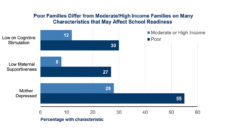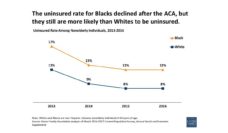Being pregnant and uninsured is bad for both a mother’s and her baby’s health. Approximately 40% of new Hispanic mothers were uninsured in 2010. This rate was twice that of first-time Black mothers (20.4%) and three times the rate of new White mothers (13.3%).
Between 2010 and 2017, uninsured rates among Hispanic, Black, and White new mothers fell by 39%, 41%, and 47% respectively. The greatest reductions occurred in 2014 and 2015, following the implementation of the Affordable Care Act (ACA) which established several coverage provisions for new mothers.
Nevertheless, insurance coverage disparities still exist between mothers of different races and ethnicities. As illustrated by the graph, uninsured rates in 2017 remained highest for Hispanic mothers (24.4%), followed by black mothers (12.1%), and white mothers (7%). These differences in insurance coverage exacerbate disparities in maternal and child health, such as maternal death from pregnancy and childbirth complications and infant death rates, as well as access to postpartum care, and overall family well-being.
While the ACA has improved insurance rates among new mothers, additional policies and efforts are needed to close existing gaps. Some legislators have already begun to advocate for policies that extend pregnancy-related Medicaid coverage from 60 days postpartum to one year. Outreach efforts that target Black and Hispanic women could also increase insurance enrollment, ultimately narrowing racial and ethnic gaps in coverage among new mothers.
Databyte via “Racial Disparities in Uninsurance among New Mothers Following the Affordable Care Act“. Urban Institute, 2019.














